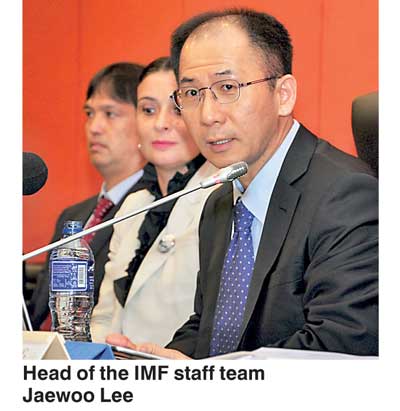Friday Feb 20, 2026
Friday Feb 20, 2026
Monday, 26 September 2016 00:01 - - {{hitsCtrl.values.hits}}
 A team from the International Monetary Fund (IMF) led by Jaewoo Lee visited Colombo from 13-23 September to hold discussions on the first review of the Sri Lankan authorities’ economic program, which is being supported by a three-year Extended Fund Facility (EFF).
A team from the International Monetary Fund (IMF) led by Jaewoo Lee visited Colombo from 13-23 September to hold discussions on the first review of the Sri Lankan authorities’ economic program, which is being supported by a three-year Extended Fund Facility (EFF).
The program aims to support the authorities’ ambitious reform agenda to put public finances on a sustainable footing and create space for its social and development program. The mission met with President Maithripala Sirisena, Prime Minister Ranil Wickremesinghe, Finance Minister Ravi Karunanayake, Central Bank Governor Indrajit Coomaraswamy, parliamentarians, other public officials and representatives of the business community, civil society and international partners.
At the end of the visit Lee made the following statement:
The mission made significant progress toward reaching a staff level agreement with the Government on the completion of the first review. Discussions will continue in October in Washington D.C. during the Annual Meetings of the IMF and World Bank.
Overall, macroeconomic performance in the first half of 2016 reflected a mix of improving balance of payments, reduced growth mainly related to recent floods and slightly higher inflation. The mission welcomes the effective tightening of fiscal and monetary policies that contributed to improving market confidence and easing pressures on external balances.
The mission commends the authorities for implementing their IMF-supported economic program under difficult circumstances, with all quantitative targets through end-June being met. However, some forward looking aspects of the program review, mainly related to the implementation of the tax reform package, need to be addressed without further delay.
Accordingly, it is important that the Government expedites the legislative process of implementing the value added tax (VAT) amendments that are needed to support revenue targets for 2016 and 2017. The 2017 budget should also be underpinned by a well-crafted and high-quality tax policy strategy to raise Sri Lanka’s low tax revenue-to-GDP ratio. Commencing the legislative process for the new Inland Revenue Act would be an important step in rebalancing the tax system toward a more predictable, efficient and equitable structure and in generating the needed resources in support of the country’s ambitious social and development objectives.
The mission welcomes the Central Bank of Sri Lanka’s (CBSL) move to preemptively raise policy rates to maintain inflation within its target band. The CBSL should remain vigilant in monitoring inflation pressures and stand ready to tighten further should inflation or credit growth continue to rise.
In light of easing external pressures, the mission encourages the CBSL to continue its effort to rebuild international reserves and maintain exchange rate flexibility to further develop the foreign exchange market. In this regard, the mission and the authorities discussed plans for a transition to flexible inflation targeting as the monetary policy framework, possibly supported by IMF technical assistance.
The mission also encourages the Government to make concerted efforts in implementing structural reforms in public financial management and state-owned enterprises, building on the substantial technical assistance received over the years. Renewed efforts toward greater integration into regional and global supply chains, higher levels of foreign direct investment (FDI) and enhancing prospects for private sector investment are important for achieving medium-term macroeconomic objectives. Bolstering competitiveness to boost trade and private sector development will also support growth potential.